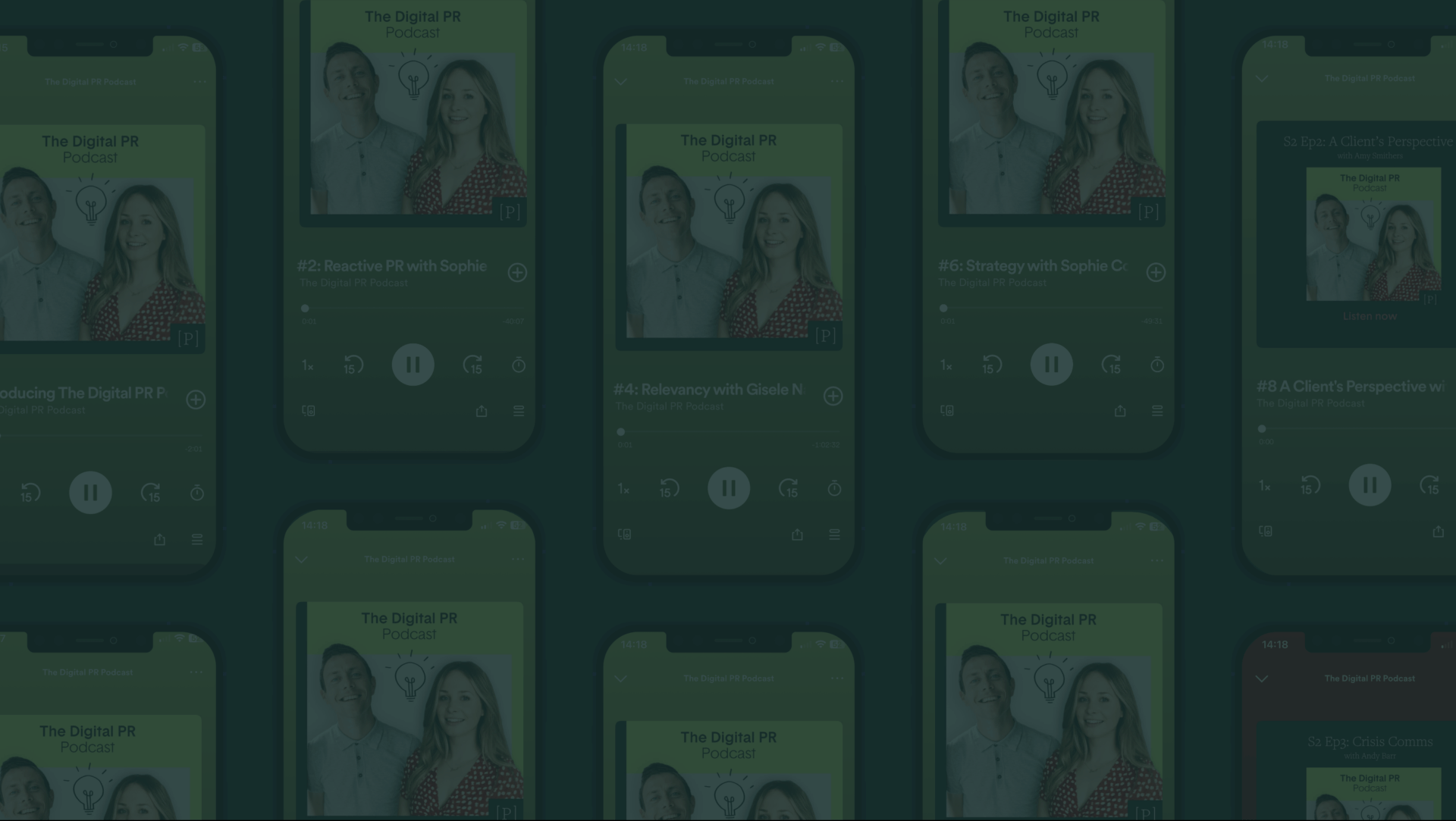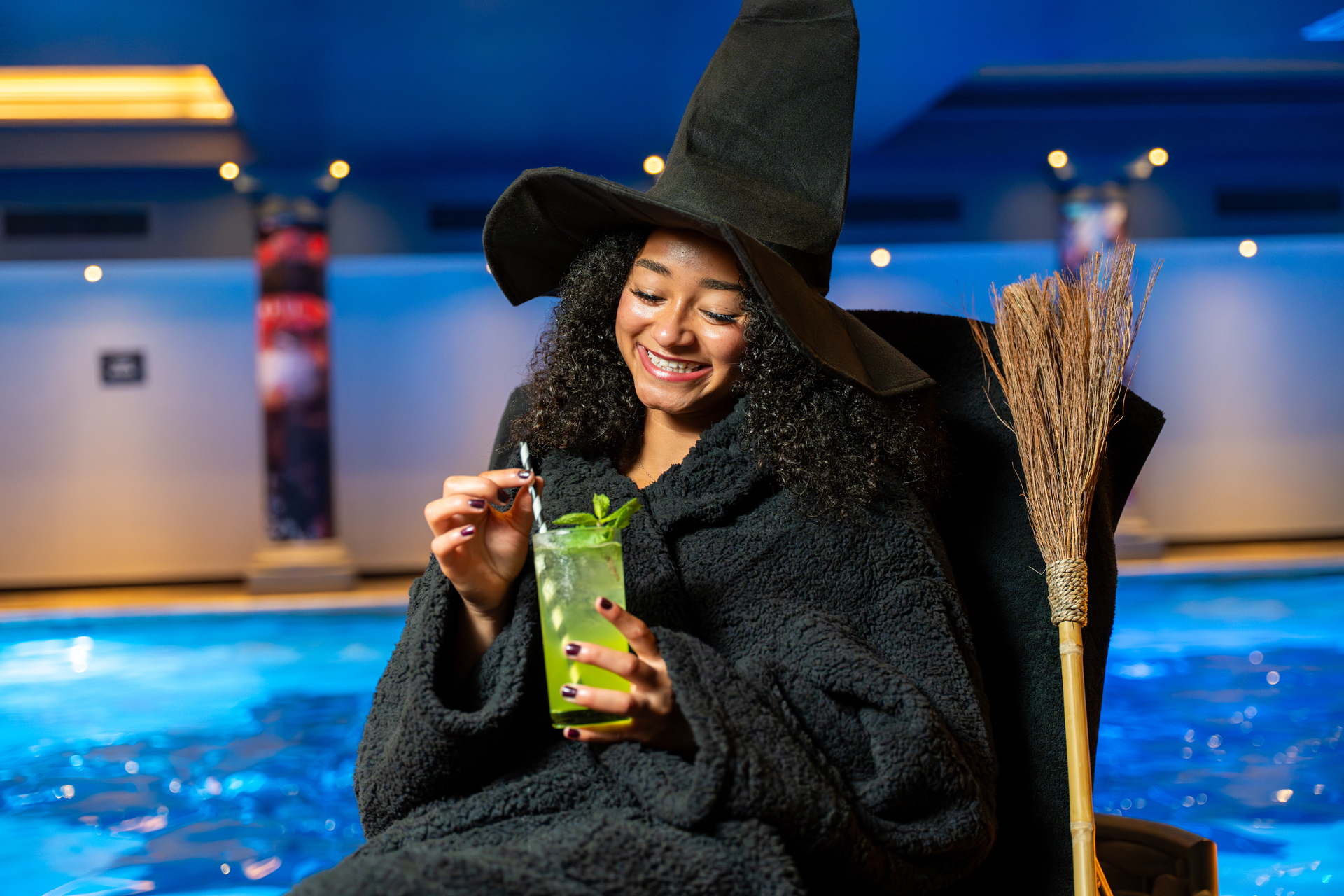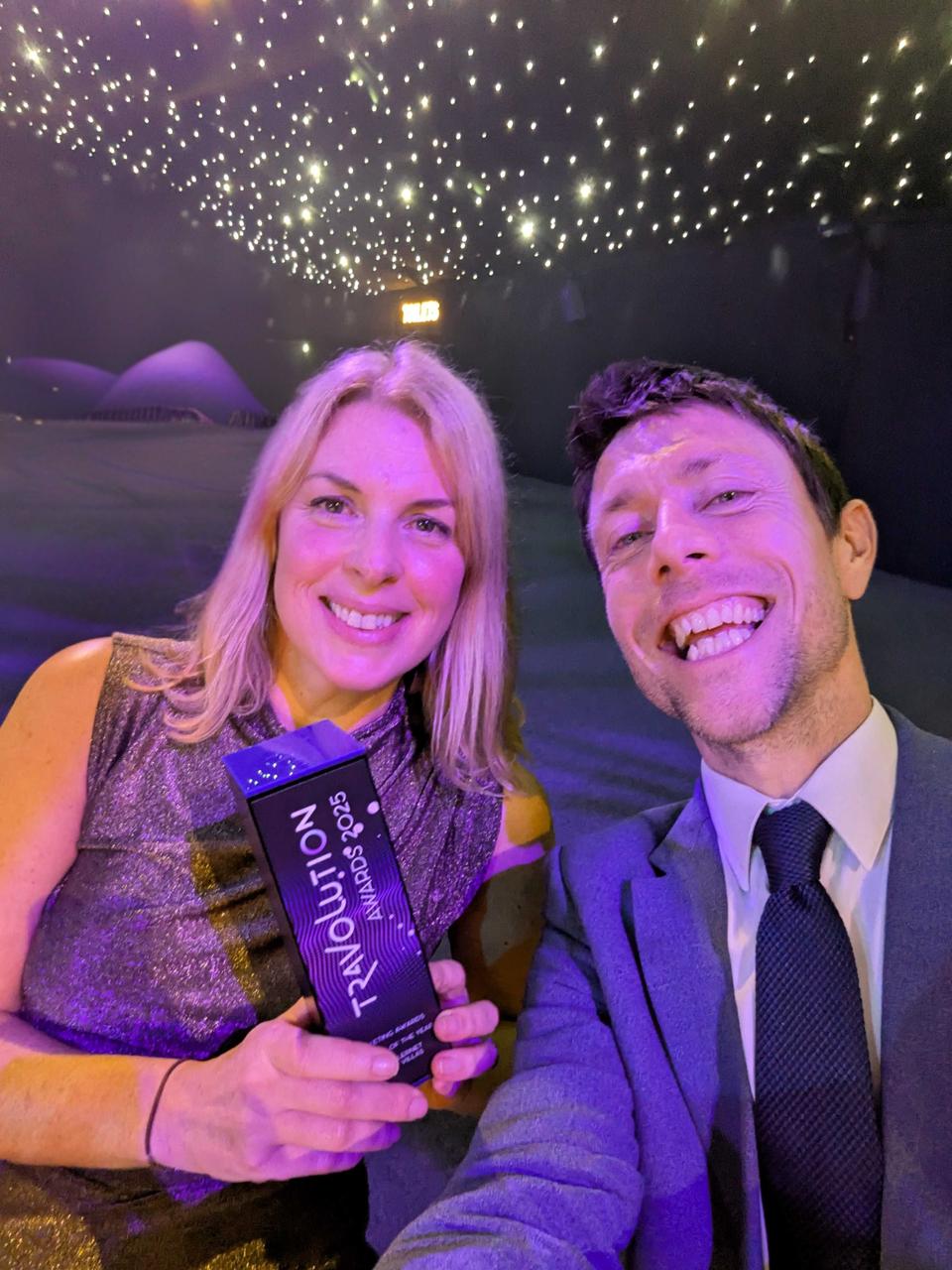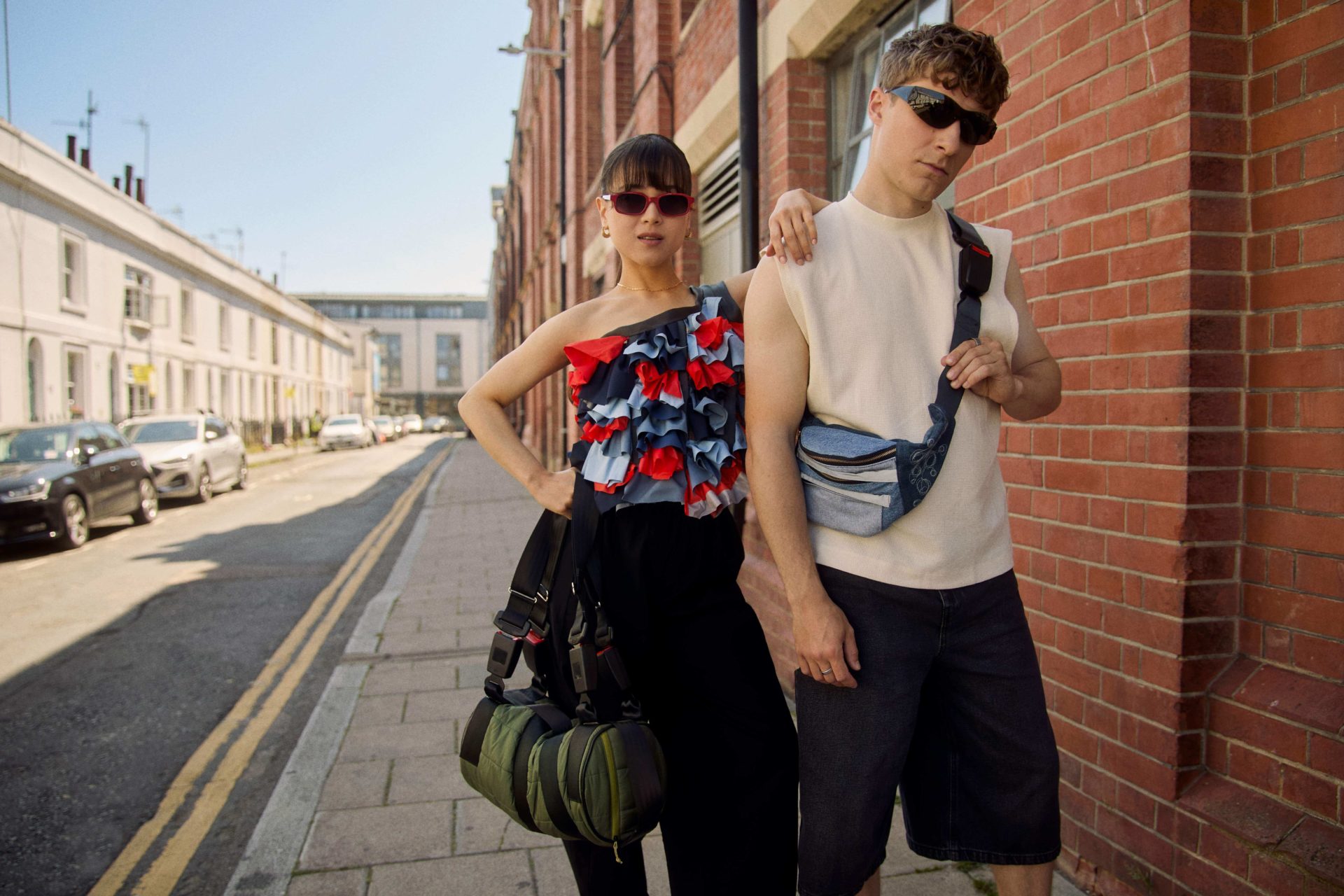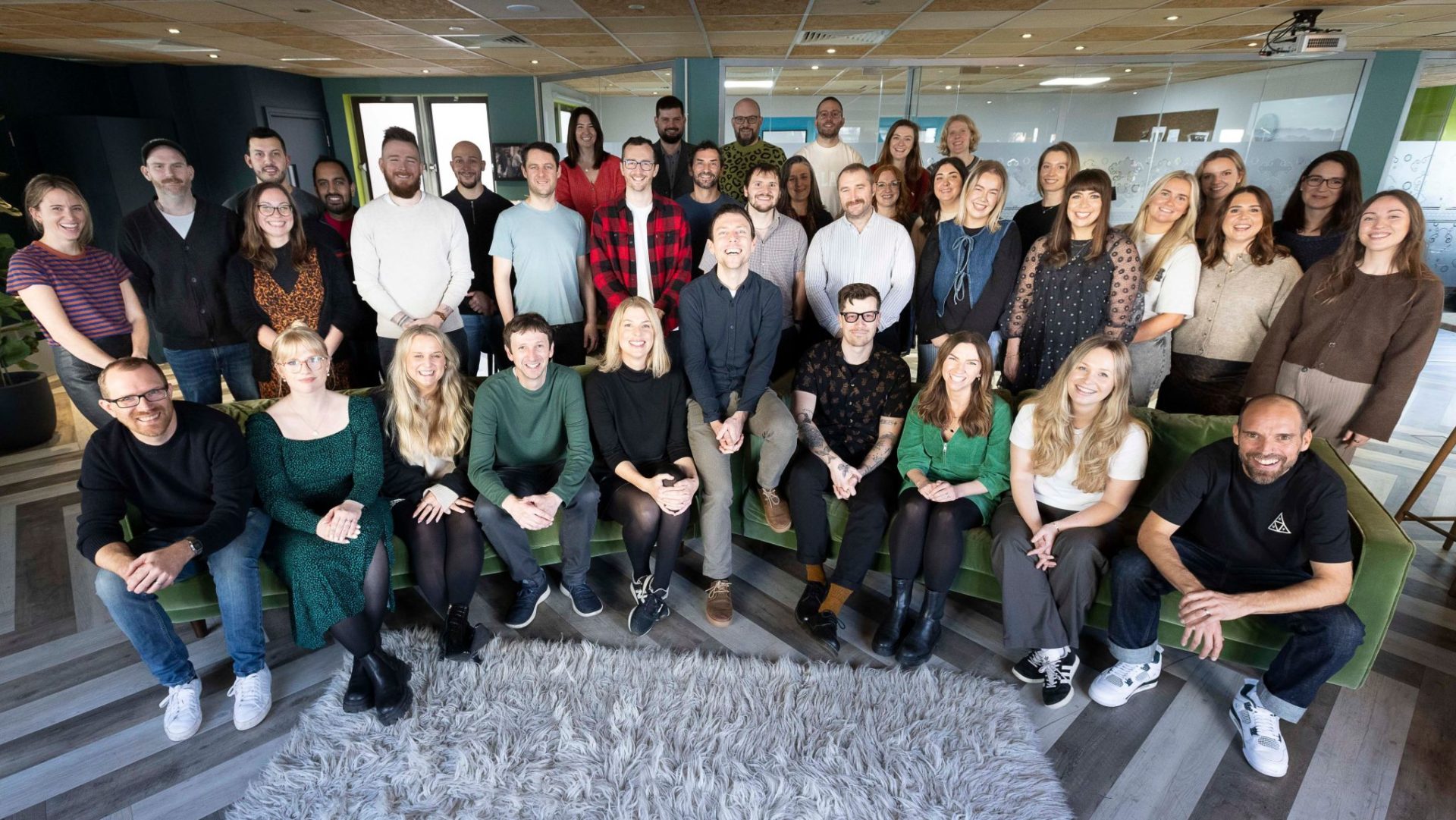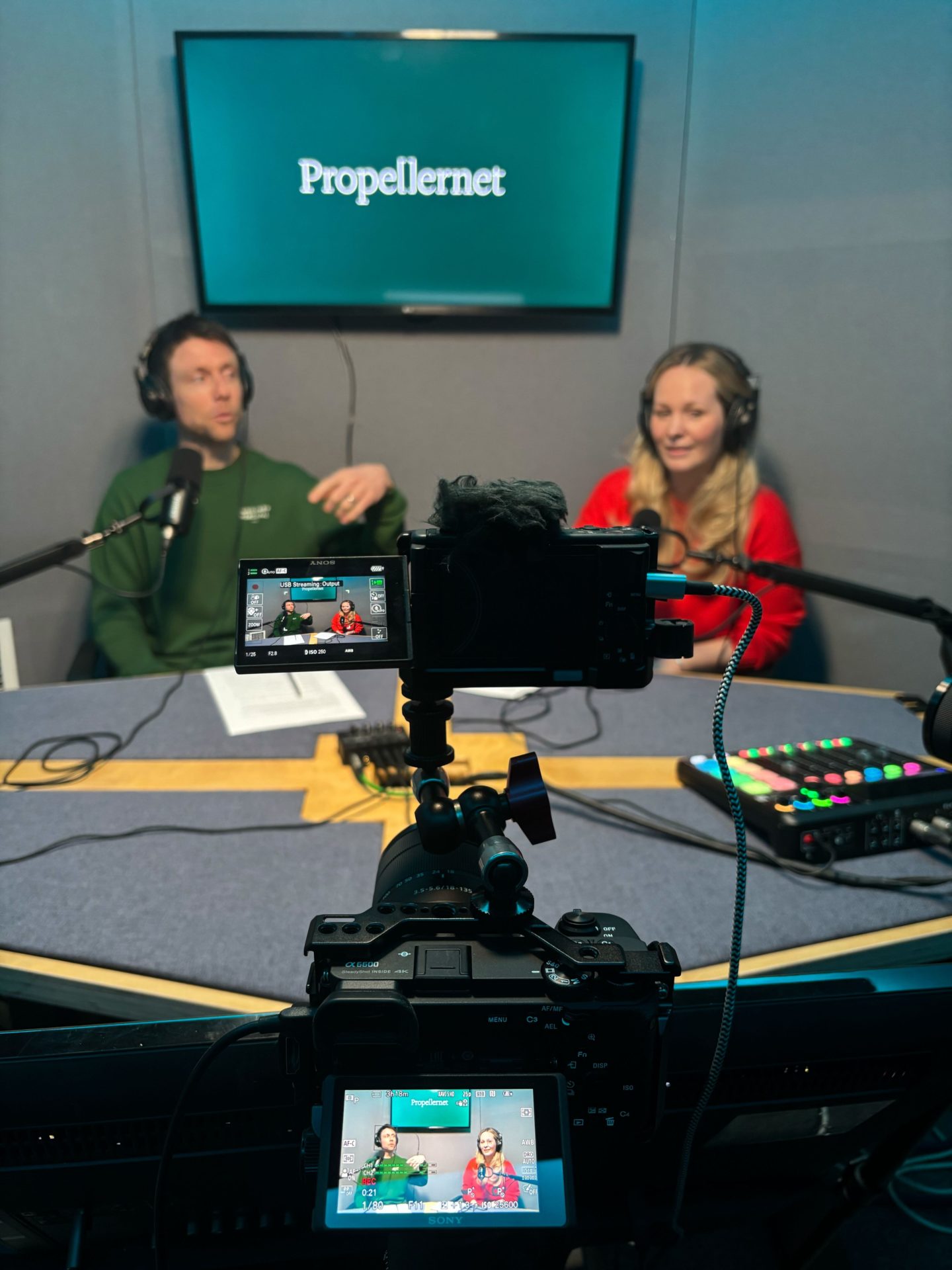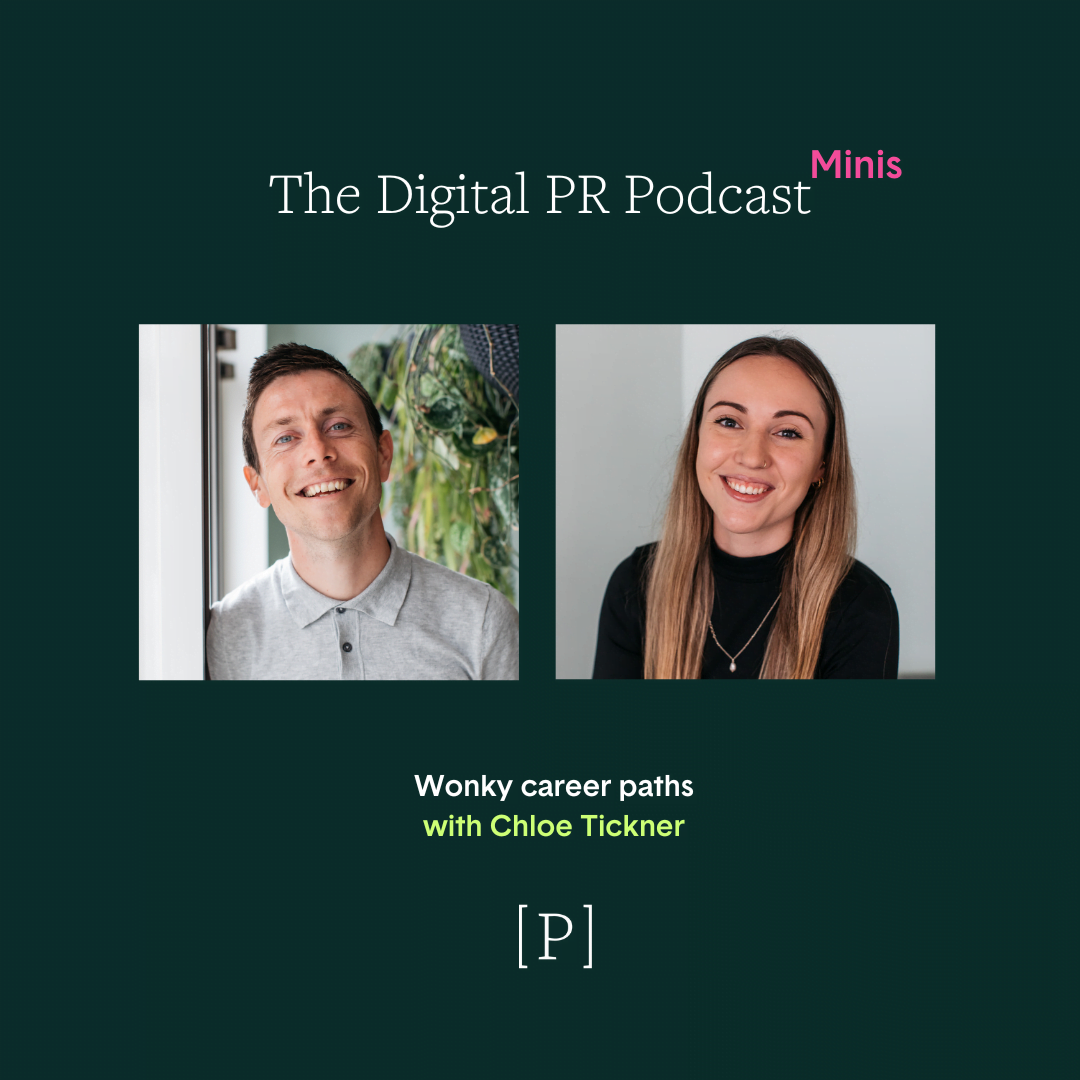
In episode five, Chloe Tickner, our brilliant Senior PR Exec, talks us through her ‘wonky’ career journey. We talk about her journey from studying biomedical science to becoming a PR pro, starting over and the importance of interrogating everything. Have a listen or you can read the summary of AI transcript below.
Go back to all episodes0:00:06 – Stephen Baker:
Hello, and welcome to the Digital PR Podcast. I’m Steve Baker, and my co-host Lou is off doing the rather more important job of raising a tiny human. But the show must go on. We’re in between seasons at the moment, but thought we’d give you all a little treat by bringing back our mini episodes throughout June and July. We’ll be jumping into all of PR land’s hottest topics, as we always do, and hearing from members of the Propellernet PR team on everything from pitching to personality types. So get the kettle on, get those headphones charged, and make sure to subscribe so that you don’t miss any of our episodes. Delighted to be joined by the wonderful Chloe, who is here to discuss, and I’m intrigued by this, Chloe, your, as you labeled it, a wonky career path. I’m intrigued by this. Firstly, thank you for joining. Always a pleasure to be chatting to you. How are you?
0:00:58 – Chloe Tickner:
Very well, thank you. I love when you’re intrigued by something. It always makes for a good conversation.
0:01:03 – Stephen Baker:
I’m very intrigued. So we’re here to talk about your, your career path. Let’s start with, well, let’s start sort of what’s happening right now. What’s your role within the Propellernet digital PR team?
0:01:17 – Chloe Tickner:
I am a senior digital PR exec and I work on a range of clients from the automotive to the fitness and travel industries.
0:01:26 – Stephen Baker:
Lovely and what a fantastic job you do may I just say as a little addition before we get into your career path because you’ve had what you have called yourself a wonky path into PR which is intriguing for me and I think will be for the listeners as well because everyone has a different career path doesn’t always follow like a really linear format so Can you tell us about your your career path from sort of studying to where you are now?
0:01:57 – Chloe Tickner:
And indeed, yeah, I call it wonky, but you could call it whatever you like. Squiggly is another really good word. So, yeah, I I think like a lot of people in fairness didn’t study marketing, so I didn’t find a way into the industry in a very sort of traditional sense. But I’ve definitely done a few different things, which I think surprised people a little bit sometimes when I talk about where I’ve been, um, and how I ended up doing PR.
So yeah, I started by studying biomedical science at university. So obviously went into university at the age of 18, as most of us do, um, straight from a levels to uni with no real like gap in between. To really figure out what it was that I actually wanted to do. So I went straight into studying science just because that was something that I really enjoyed at school and spent three years doing that in London. I think by the end of that I, based on sort of the decisions that I made during my degree ended up spending a lot of time staring at brains by myself in a very dark room.
So when I graduated I was like, I really need a break. So I went and worked as festival staff in Europe over the summer, which obviously was very fun and at the age of sort of 21 was very much like a ‘This is really fun and I want to do more of this’ kind of vibe. So after that, I decided to basically see how I could do it for a little bit longer.
So I went and applied for a load of different things. I was going to work on yachts in Croatia for a bit. I was going to go volunteer in Cambodia and then I got offered a job as a tour guide in the Philippines. Which was very exciting. So I went and did that. So I spent most of my early twenties guiding tours of like 20 odd people around the Philippines, which was very, very fun. Um, and I met tons of different people from. Australia to the US to Norway and a bunch of other countries so yeah that was really really fun but was obviously completely different to what I had studied and nobody could understand why I was doing that when I’d been studying biomedical science and whatever.
So I stayed there for about three years and kind of just fell into social media through that job. So obviously working for a travel company, social media is like a really big part of it. And I think I was one of the people that sort of expressed an interest in doing that side of things. So fell into social media just because I thought it was quite fun. And then from there, literally just fell into doing more of a marketing role overall. So we have off seasons when you do things like that. And because social media is kind of always on, that allowed me to continue working with the company when there was an off season. So through that, I just got gradually more and more involved and then ended up working fully remotely in a marketing role, which was very much self-taught. So there was lots of online courses, lots of sort of self-guided learning, sitting from behind my computer in a hostel in the Philippines for a few years, which was really fun. But obviously it was very much a learning point. So there was a lot of stuff that I had to learn. I had no sort of traditional training at all.
Luckily, there’s a lot of stuff online that is very helpful. So HubSpot courses and Google courses. And, you know, there was tons of resource for me to learn from. But it was very tricky. And then COVID hit. So I came back to the UK. And I think after having had such a long time of teaching myself and not really having anyone to learn from, I was kind of desperate for a bit of guidance. So was through the process of looking at all of those like online resources, there was groups like I think Girls in Marketing was one of them on the Facebook group, which is actually where I saw the internship for PropellerNet advertised. And then about a week later, I saw Lou, who was our other head of PR’s TikTok, and she was posting a video about the internship. And now that I’d seen it twice, I was like, this feels like fate. So I applied and that has basically led me to where I am now.
0:05:32 – Stephen Baker:
What a story, you’ve done so much. I remember, I remember interviewing you really, really clearly because you were, you’d just come back from the Philippines, I think. Yeah, it’s very fresh. Yes, you’d literally just come back and I remember that and I remember you wowing us with your creative ideas. and your design like work that you’d sort of showcased, but I’d forgotten you’d studied biomedical science. I think you touched on that briefly, but it is really intriguing how you’ve gone from that and then sort of worked your way into the role you are now. With all of that variety and all of the different things you’ve done, how would you say that’s benefited you? How do you think it’s benefited you as you’ve kind of moved through those different roles to where you are now?
0:06:22 – Chloe Tickner:
Yeah, good question. I think not to sort of toot my own trumpet, but I think I have quite a varied skillset because of it. So hopping around, I think traditionally is not necessarily seen as a good thing. I think we sort of, my age group anyway, as we were growing up, it was seen as a bad thing to move jobs too many times. And you should be somewhere for a minimum of, you know, a few years to make it look like you don’t just move on really quickly. And it’s definitely not seen that way anymore. And I think it’s growing towards that kind of way but like in general. It is so beneficial to do that, to gain skills that you just wouldn’t necessarily gain if you were staying in the same place all the time.
So I think in terms of my degree, having that scientific background, particularly for PR, I think is so helpful because it’s made me super analytical and it’s helped me to think really critically and sort of evaluate things, which is obviously hugely important in PR to make sure that we’re going out with robust stories that are, you know, genuinely going to be successful, make sure we’re not putting out rubbish. Um, I think guiding. taught me a lot of things to be honest and a lot of that was just really good life skills as well but obviously things like time management is massively useful in what we do now so I work obviously in an agency so we have lots of different clients so working on my time management in that sense where I had to make sure that everybody was in the right place at the right time has been really useful to then take into roles with me like in the future. Public speaking you know, confidence. I think it also helped me build a lot of tenacity, which again is super useful in PR because the nature of PR is obviously that it’s not exactly guaranteed.
So I think having that sort of tenacity and the persistence that’s required to, you know, keep pitching a story if you’re not landing with press and sort of keep pivoting and finding new angles and that kind of thing is really useful. I also just think working remotely in the way that I did for quite a few years, definitely taught me to be proactive, which is just useful in any job role. So obviously being proactive, I think in PR particularly, it’s such a sort of fast paced industry and things are moving and changing all the time that it’s super useful to be able to be proactive in terms of your own development and just making sure you’re keeping your finger on the pulse. But in general, just teaching yourself how to be proactive and sort of go after things yourself without relying on people too much. It just makes you a very useful colleague in general.
0:08:41 – Stephen Baker:
Yeah, such a good answer. And I was listening with such interest because it makes me think how varied The reason I’ve been in PR, digital PR for such a long time, I think is because there is such a lot of variety and you touch on all of that. The scientific background helps you to be analytical. There’s the sort of persistence, tenacity, there’s the creative aspect, there’s the time management. I’m not saying this is completely unique to digital PR, but it certainly, certainly helps having all of those things sort of in your locker for want of a better phrase. I’m gonna kind of flip the question, I suppose, like that’s how it’s benefited you. Has there been any kind of downsides to sort of having a wonky or squiggly career path? So for example, have you ever been held back from a role because of your career path?
0:09:32 – Chloe Tickner:
Definitely not. I think I’m very fortunate in that I have gotten the jobs that I’ve gone for. I think part of that is just applying for stuff that very much suited my skill sets and stuff that I was really passionate about. Obviously, it’s not like I’ve gone for completely different opportunities where it might hold me back to, you know, not necessarily have that experience. I think there’s an element of starting from the bottom. So obviously if you’re going for different jobs and you’ve been doing something that’s been, you know, in a completely different direction for a long time, it might be harder to get that job. And then when you do get it, you’re starting from the bottom because you have to sort of learn a whole new thing again. But I think to be honest, that is the way that the world is moving. And I think as long as you’ve got. enough transferable skills from the things that you have done that you can start as a beginner and you can work your way up as quickly as you want to. So I’m very lucky I have not been held back. I think in this day and age, honestly, if there was, if you were turned away from a job for having too much experience across a number of different areas, then for me, that wouldn’t be a job that I’d want to have anyway. So I would say don’t for anyone that was worried about it, I would say, don’t let that fear sort of hold you back.
0:10:45 – Stephen Baker:
Yeah. That’s nicely put, that you wouldn’t want a job that you’re held back from for those reasons. So that makes perfect sense. I mean, you’re an experienced PR person now. You’ve built your way in digital PR and with Propellernet, which has been a joy to be part of, behold, all of that kind of stuff. What would you say are the top skills? You have lots. let’s narrow it down a little bit. What are the top skills that make a good digital PR person regardless of career history and regardless of the path that someone’s been on?
0:11:24 – Chloe Tickner:
I think you put it quite well earlier. There’s a lot of skills that aren’t very specific just to digital PR. I think there’s a lot of skills across the board that are really useful if you’re going into PR because as you said, there’s so much variety and we do so many different things from copywriting to pitching to ideation to working with clients So I think having a broad skillset is the most important thing. But for me, there’s like a few things that definitely help sort of make you stand out, or at least like sort of help make your work and your stories stand out from the rest, particularly given how sort of busy the industry is these days.
Uh, one of which would be interrogate everything. So you’ve got to find inspiration at any time. So I think when you are naturally sort of interrogating everything that you read or everything that you hear or listen to, It really helps you find the kind of nuggets of everyday life that will make good stories. That’s something that I think I very much get a benefit from my scientific background with. So making sure that you’re interrogating the world around you to kind of get those stories. But then also once you’ve got your story, interrogating that data, interrogating your write-up of it, just basically making sure that you’re going out with really quality stories on behalf of your client.
Secondly, I think learning how to roll with the punches. for want of a better phrase, PR, obviously I already said is not guaranteed. So I think the nature of it is that it’s always moving. You have to keep evolving your processes. You have to keep evolving the work that you do, and you’ve got to be sort of hungry to develop and try new things all the time. So I think if you want to go into PR, you’ve got to be sort of ready, ready for that. Um, and very willing to do that in your sort of everyday job.
And then finally, I’d say just be willing to learn. So you can, this is sort of a bit more specific to like agency work as well. So you can. learn so much from the people around you, especially if you’re in an agency, you’ll be surrounded by people that have so much sort of different levels of experience to you. But you’ll also quite often be working on clients and industries that you might not know as much about as other industries. So when you take on a new client, for example, you might not have worked a huge amount in that industry, or maybe you did work in that industry, but it was a little while ago, and now you’re getting back into it. So I think constantly finding out what’s working from people, asking the people around you, asking people questions about topics they know a lot about and sort of just understanding that you’re never going to stop learning is one of the best sort of traits that will help you go far.
0:13:40 – Stephen Baker:
Yes, for sure. How easy or difficult do you find that? Because that’s, that’s, again, one of the elements of variety that I really like. in terms of like, you know, you get a new client in a new industry, and you’ve got to do a lot of work, a lot of research to really understand how that industry works, who the competitors are, like what’s being talked about, you know, that’s how we thrive is like understanding what journalists in that sector are talking about. But yeah, for you personally, with your background, how easy or difficult do you find that?
0:14:14 – Chloe Tickner:
It’s definitely not easy. Like, I think that’s probably one of the hardest things, particularly when it comes to ideation. So there’ll be quite a few times when I’m working on, because we often come up with ideas for clients that we don’t necessarily work on all the time as well. So sometimes it’s like, I don’t, you know, own my own house, for example. So I’ve never gone through the house buying process. So when it comes to ideas targeted towards house sellers and house buyers, that is very much a mindset that I have to plonk myself into as much as possible. So I think It’s definitely tricky. There’s so many great ways to do it in a PR sense.
So I think when you start on a new client doing all of the basic sort of client interrogation stuff, so looking at their competitors, as you said, sort of doing an analysis of their competitors, looking at the stuff that gets covered in that industry, um, and just sort of getting your head into it from that sense. So look at what people are talking about is really useful. But honestly, I think we call it the hive mind. I think a lot of us in the team, we have so many people in the team that have so many different. interests and like niches that they kind of specialize in or just stuff that they’re interested in outside of work.
And I think leaning on those people and asking people questions and just constantly having those conversations is so great. Like, I don’t know that much about skincare and beauty, like I have a very basic sort of skincare basic beauty routine, but we’ve got people in the team that really love that and spend a lot of time researching it and just asking those people questions and having conversations with them and learning about those areas that you’ve got a colleague that has loads of knowledge in is one of the greatest ways to sort of really cement your knowledge in that area and just sort of get into the mindset of that client or that audience.
0:15:50 – Stephen Baker:
Yeah, it’s always good to lean on others and really interesting as well because I’ve never, I don’t think there’s a right answer. I’ve often wondered like how beneficial or not it is to have experience of like the house buying example you gave is a really good one. So I am a homeowner. But when I’ve come to kind of generate creative ideas for like a property client, where that is like a key, key theme or factor. It’s almost like my mind is clouded with my own experience, like sometimes being removed from it. and not having that direct experience can be really, really helpful. And driving or cars is another one. You have an automotive client, right? Am I right to say, but you don’t drive?
0:16:39 – Chloe Tickner:
I don’t drive. I have driven. I’ve driven in the past. I don’t currently drive. So yeah, that’s definitely another great example. At least with that, I have had some experience. Like I have driven a car in the past, but yeah, I don’t currently own my own car. So it’s another one where it’s like, okay, I need to get into this mindset now. But I think it’s another reason why it’s so great when you. work in an agency setting, and there’s so many of us, you have an ideation session where you’ve got, say, three people that are currently driving and have a license and own their own car. And then you’ve got three people that don’t own cars and never drive. They might have their license or they might not. And it just means that when you put all of those people together, you’ve got the people that are coming up with ideas from both sides. And then vice versa, you’ve got people on both sides that can interrogate, like you just said, because they’ve got that outside perspective. I think it’s such a useful thing to have so many people with those different skill sets and those different interests and knowledge areas.
0:17:31 – Stephen Baker:
Yeah, it’s good to get, for sure. It’s good to get a blend, isn’t it? Where you have experience versus maybe not such a direct experience or even like likes, dislikes. So I’m not, I drive, but I’m not big into cars. And I sense that if you’re approaching like a, let’s, let’s stick with the automotive example. If you’re like a big petrol head. and you’re really into cars, you’re going to come with loads of preconceived ideas and things that you like and dislike. Whereas I’m like, OK, I can see almost the practicalities of it rather than this absolute love of all things motoring. And I think both can be useful. So getting that blend, really, really important. With all of the experience you have in your kind of squiggly career path, you know, from science to sort of tour guiding, to social media, to design, all of that, you’re now in digital PR. Is there anything that you really want to do in your life, like a career that you’ve always kind of thought of like, oh, I’d love to transition into, I’m not trying to turn this into like an impromptu one-to-one on a podcast. I’m just genuinely quite interested because it’s something I give, I give thoughts to every now and then.
0:18:43 – Chloe Tickner:
This feels like, do you remember when you were at school and you have a careers advisor chat? when you’re going you have like a one-on-one and they’re like what do you want to do with your life?
0:18:52 – Stephen Baker:
I’ve got a list of things you can do you can you know be an astronaut you can town crier.
0:18:58 – Chloe Tickner:
Being an astronaut would be fun. Yeah I think honestly one of the biggest things for me is like I finally landed in this place now I’m like I’m 28 and I’ve gotten to this place where I found digital PR, I found this niche where it feels like all of my skills from the last 10 years or so, you know, my working life post-university, it feels like all of those skills have now come together and I get to use all of them in my role every day. So in terms of the work that I do and how that kind of uses my best skills, I feel like that is where I want to be. In terms of the stuff that I do, we I think at PropellerNet quite frequently do a sort of a lot of charity work and that is one of the things that I love the most. So in my first, so I’ve been here for like three and a half years, I think in my first and second year myself and Maddy Davies did the Canne Young Lions competitions with the PRCA, which is where you work on a non-profit brief.
And then last year a few of us competed at the Creative Shootout as well, which was again a non-profit brief, this time for Carers UK. And because I love what I do so much, I think I find a real enjoyment in taking all of those skills and applying that to a completely different brief which is unlike anything we do on a day-to-day basis. So obviously everything that we do work-wise is obviously very consumer driven and it’s for businesses but when you get a charity brief it’s very different. So like the KPIs can often be you know you’re not making money or driving traffic to a website where you’re trying to get people to make purchases and such like instead you’re maybe driving sign-ups for volunteers or you’re building brand awareness and with those different KPIs and with just the topic of what you’re talking about in the nonprofit sector being so entirely different to what you might be talking about when it’s an automotive company or a property company. I kind of love that. So I find those briefs really interesting to work on. And yeah, I would love to do more of that in the future.
0:20:55 – Stephen Baker:
Very nice. Duly noted. Duly noted. So let’s kind of summarize, I suppose. I was gonna ask you sort of top tips, but maybe like, let’s narrow it down to like, you’ve done an awful lot of work, you work really hard and you’ve mentioned a few things already about how you transitioned into PR, but if there’s people listening that are looking to make a sort of a sideways jump or just transition into the world of PR, digital PR, marketing, et cetera, what’s the main piece of advice you’d give to someone in that position? How do they do it?
0:21:29 – Chloe Tickner:
I think honestly, I’d say just don’t be afraid to make that jump. I think, as I already said earlier, it has historically been seen as such a bad thing to keep making sideways jumps. And it can be quite scary, particularly the older that you get to sort of feel like you’re starting from the beginning and having to, you know, start at the bottom and make your way up again. I genuinely believe if you’ve got what you think are transferable skills from different industries or different businesses, different companies, like you can play on so many of those and they can be such strengths. So I think if you need to make that hop over to say PR or anything else, or you’re scared about the fact that you’re going to have to start from the beginning, just don’t be afraid of that.
Lean on your skills, sort of understand. why those skills will make you really good at that job role. Maybe, you know, hone in on anything that you think you could develop to be better, but generally just have that confidence in yourself, have that confidence in your transferable skillset and trust that you’ll, you know, you’ll develop quickly. So it’s been three and a half years since I was an intern. I’m now a senior PR exec. I think truly, if you’ve got that skillset that you need to be good in that role, and you genuinely believe that. If you’re put in an environment where you’ve got the support that you’re going to need to develop, then you will do so. So I think don’t be afraid to jump ship because it might be a great idea.
0:22:46 – Stephen Baker:
Inspiring words to finish on, Chloe. Thank you very much. Pleasure to chat to you about your… I’m going to go with squiggly. We said wonky at the start, but squiggly just, I think you’re right. It’s a nicer word, I think. So thank you for sharing your squiggly career path and advice for people who might be considering similar moves or sideways jumps or leaps into the world of PR. Pleasure to chat to you. Thank you very much.
0:23:12 – Chloe Tickner:
Thanks. Nice to chat to you as always.
